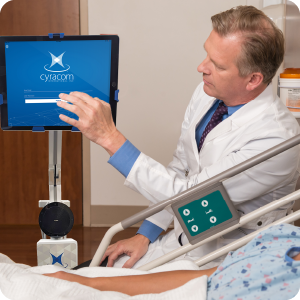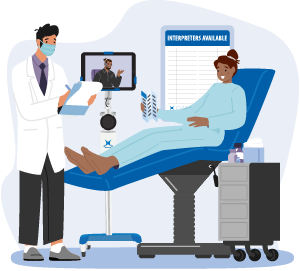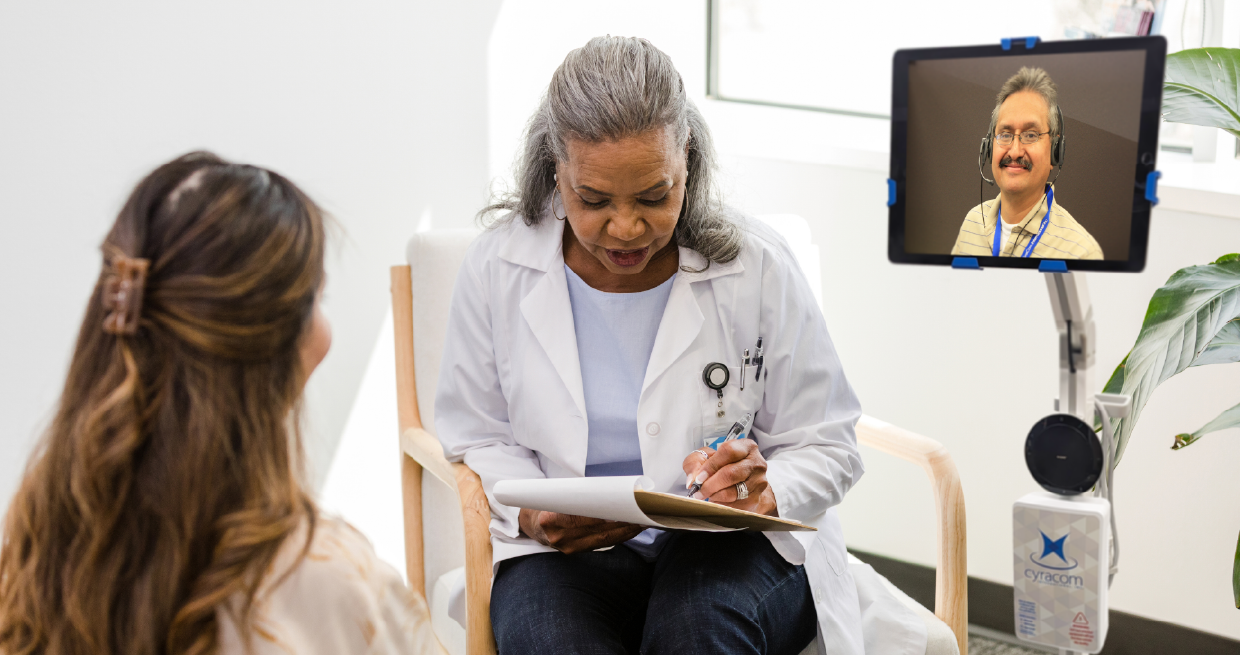The University of Pennsylvania Health System, better known as Penn Medicine, wanted a full-service language service vendor with a detailed plan to painlessly establish interpretation services for six hospitals and many outpatient clinics. CyraCom’s experienced implementation team stepped up to the challenge by creating a straightforward, flexible plan to minimize patient disruptions, strengthen staff adoption, and deliver excellent service.
Implementation
Penn Medicine chose CyraCom as its language services provider in 2021. CyraCom took control of the whole implementation process by scheduling bi-weekly meetings and delivering weekly email updates for the planning phase, followed by the on-site deployment.

Step 1: Establish clear communication
When Penn Medicine chose CyraCom as its language services provider, we immediately scheduled an onboarding meeting with their primary stakeholders to discuss how we would accomplish their goals.

Penn Medicine’s goals:
- Establish video interpretation in 10 locations, including six hospitals and four outpatient clinics, without unnecessary disruptions to patients and staff members.
- Train staff members to use CyraCom’s VRI equipment and services efficiently.
- Collect data on interpretation services usage from each location to determine the volume of minutes and user satisfaction.
- Receive ongoing partnership and support from CyraCom to meet all of Penn Medicine’s language access needs.
We then completed an initial Project Plan together that tackled communication preferences, project scope, and an overview of how we planned to systematically transition Penn Medicine’s hospitals and outpatient clinics’ video remote interpreting (VRI) services from the prior vendor to our services.
Step 2: Planning
CyraCom involved key stakeholders for each location and modified the plan details to meet each hospital or clinic’s needs. We kept timelines and dates flexible, making it easier for Penn Medicine’s stakeholders to balance their regular tasks with this larger project.
Equipment
CyraCom’s implementation experts helped each Penn Medicine hospital and clinic select the optimal number of VRI carts and placement for each cart based on their staff’s needs. With an equipment plan in place, we ordered the carts and ensured they would arrive on time for each location’s on-site deployment.
Custom support materials
CyraCom provided a plethora of personalized support materials for Penn Medicine’s staff in preparation for on-site deployment. For example, we created:
- Stand-up posters: These posters inform guests about the availability of no-cost interpretation services, helping Penn Medicine comply with ACA Section 1557. The posters are displayed at all entrance points where staff first encounter LEP patients.

- Phone access cards and stickers: These tools make it easy to call interpreters by instructing users on how to access an interpreter quickly.
- Language identification charts and booklets: Penn Medicine hospitals and clinics display the charts and booklets where their staff first encounters LEP customers or patients. Employees can show the chart to patients and have them point to the language they speak.
- Staff training tools: To reinforce upcoming in-person training, CyraCom provided training content such as written instructions and best practice videos that could be added to Penn Medicine’s intranet library resources or accessed via CyraCom’s client support pages.
IT connectivity testing
 During the planning stages, we discovered that Penn Medicine has a unique Wi-Fi network structure that includes different layers of access depending upon the level of security needed. CyraCom’s experts partnered with Penn Medicine’s IT team to create a solution that allowed the VRI carts to access the internet without compromising data security. Taking this extra step helped avoid complications and connectivity issues during on-site deployment.
During the planning stages, we discovered that Penn Medicine has a unique Wi-Fi network structure that includes different layers of access depending upon the level of security needed. CyraCom’s experts partnered with Penn Medicine’s IT team to create a solution that allowed the VRI carts to access the internet without compromising data security. Taking this extra step helped avoid complications and connectivity issues during on-site deployment.
Notification to leadership
One of the final planning steps was to notify each location about when their on-site deployment would take place and how to prepare in advance. CyraCom’s implementation team verified the dates and times our staff would be on-site and what Penn Medicine’s staff could expect from us.
Step 3: On-site Deployment
Once all planning and preparations were complete, CyraCom’s implementation team flew to the first Penn Medicine hospital to begin on-site deployment. Unlike our competitors that often send equipment to clients to set up themselves, CyraCom takes a hands-on approach to implementation. Our team assembled, tested, and delivered VRI equipment, saving Penn Medicine’s staff significant time and effort that would have been better used on their primary jobs.
CyraCom guided implementation step-by-step, ensuring a smooth process for each Penn Medicine location. Steps include:
Met with primary contact
CyraCom’s implementation specialists arrived on time and ready to work. We ensured our team followed all of Penn Medicine’s security protocols and procedures, such as obtaining visitor badges. Once the team checked in, they met with each location’s primary contact to answer any initial questions and review the plan in case of last-minute changes to avoid disruptions to staff/patients.
Inventory and assemble equipment
Next, CyraCom’s team took inventory of the VRI carts and any additional equipment for the location, ensuring everything arrived as expected. The team built the VRI carts, properly disposed of all trash, and ensured we weren’t hindering Penn Medicine staff or patients during the process. We tested internet connectivity and confirmed each cart worked as expected. From there, CyraCom’s team systematically delivered equipment floor-by-floor, removing the previous vendor’s equipment as needed.

Provide staff training
Once all of the VRI carts were online and in place, staff training began. CyraCom’s team met with each department to determine the best time and location for training. In addition to demonstrating how easy it is to use VRI carts, we helped Penn Medicine’s staff distribute their custom marketing materials, answered staff questions, and confirmed that everyone felt comfortable using CyraCom’s services to communicate with LEP or Deaf/hard-of-hearing patients.
In addition to training daytime staff, CyraCom went the extra mile to meet with Penn Medicine’s overnight hospital staff. Our implementation team scheduled a convenient time to meet with each department and shift to provide training during the least disruptive times, even though that meant reviewing VRI cart how-tos and tips after midnight.

Let’s partner up
Do you want your language access program to receive ongoing support, customized solutions, and hands-on implementation, all at no extra cost from your language service partner? CyraCom has partnered with thousands of clients like Penn Medicine over the past 30 years, and we’d love to be your partner too. Contact us today at cyracom.com/contact-us







